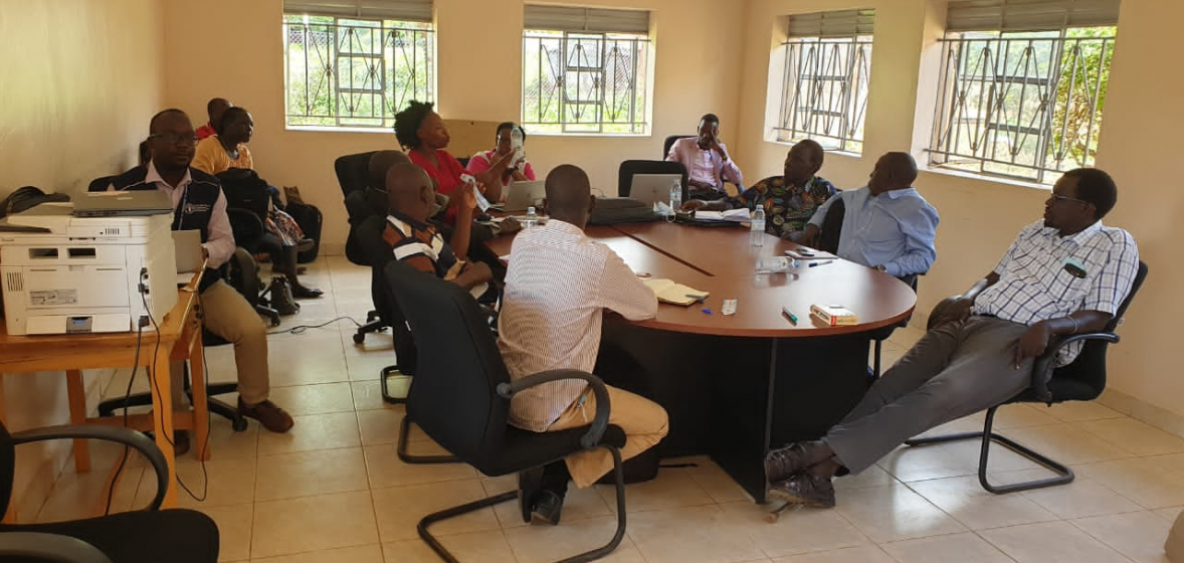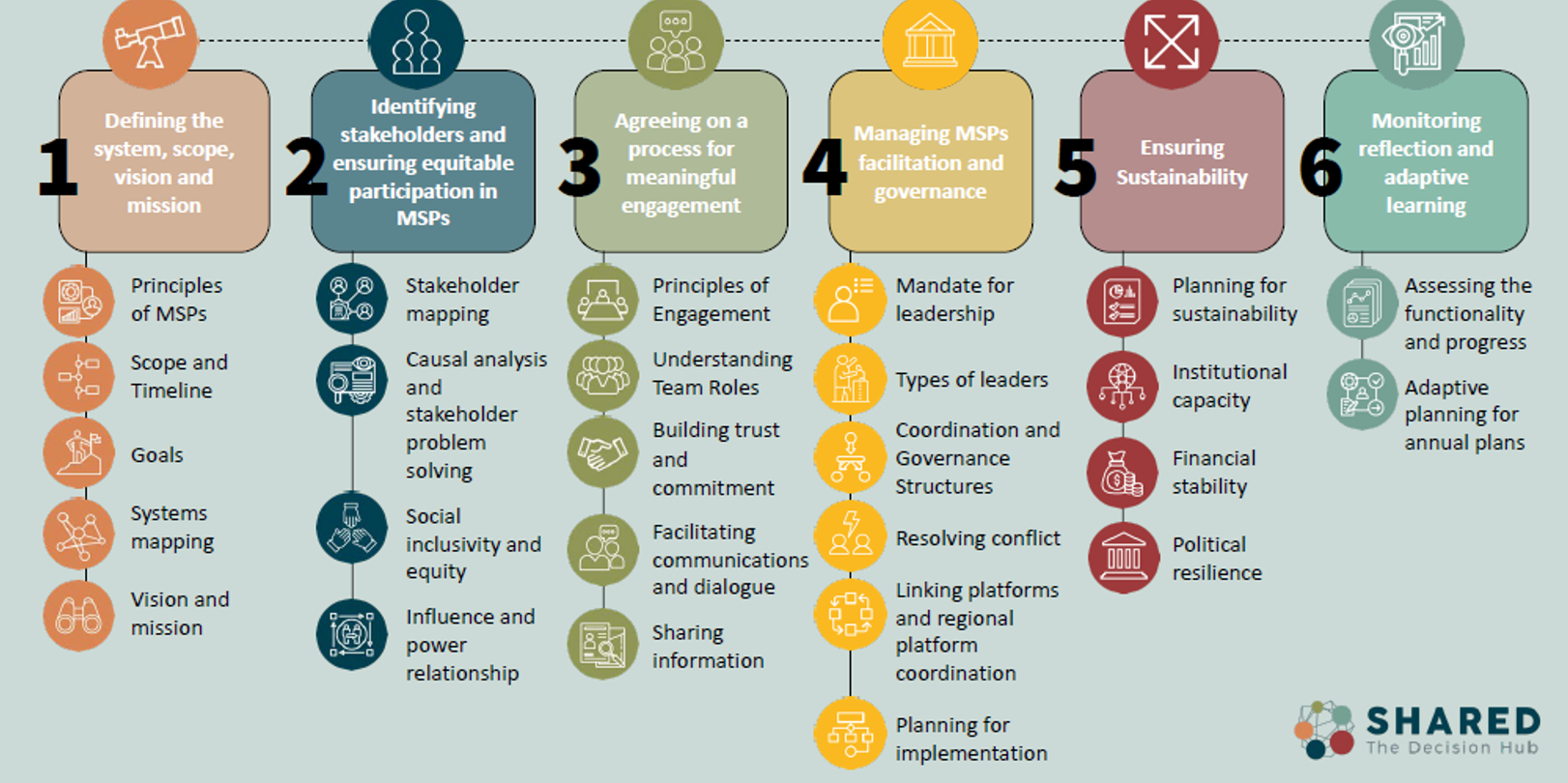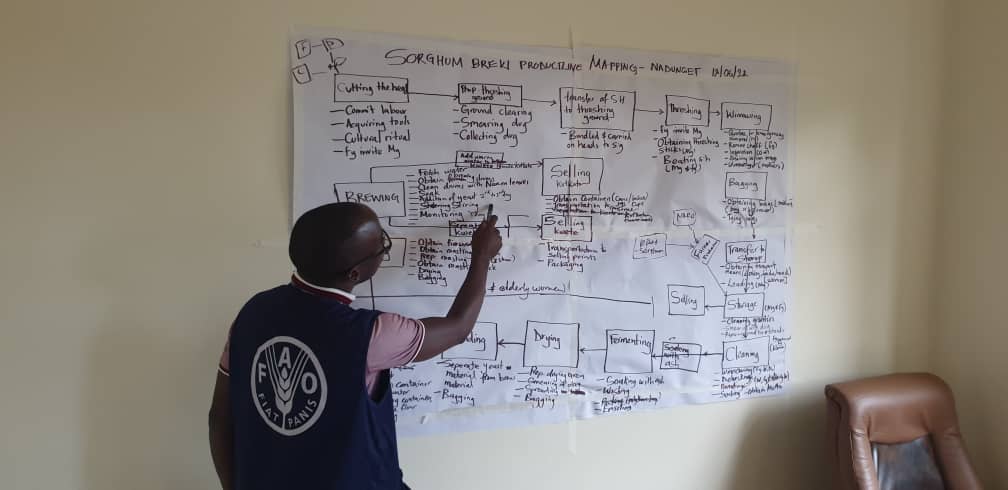 District officers and MSP members in Karamoja, Uganda. Credit: FAO Uganda
District officers and MSP members in Karamoja, Uganda. Credit: FAO Uganda Trainers in RFS Uganda project sites have been trained in facilitating multi-stakeholder platforms for decision-making in agri-food value chains.
Food passes through a multitude of hands on its way from farm to table.
All of these actors and their activities are what comprise food value chains, where everyone along the line has a unique set of needs, perspectives, objectives and capacities that affect the sustainability and resilience of the value chain.
The Food and Agriculture Organisation of the United Nations (FAO) describes a sustainable food value chain as “the full range of farms and firms and their successive coordinated value-adding activities that produce particular raw agricultural materials and transform them into particular food products that are sold to final consumers and disposed of after use, in a manner that is profitable throughout, has broad-based benefits for society, and does not permanently deplete natural resources”.
In other words, a sustainable food value chain brings economic value to all workers and businesses, benefits society, is environmentally friendly and gender-responsive, covering the list of all activities involved in the production, processing, marketing and disposal after use of food products.
But with so many cooks in the value-chain kitchen, it can be difficult to make sure the needs of all are met - especially women and resource-poor actors - given that as value chains commercialise or upgrade, many tend to be marginalised and risk being excluded from participating, consequently eliminating them from benefiting in value-added chains.
This is where Multi-stakeholder Platforms (MSPs) come in.
MSPs provide an equitable participatory decision-making and information-sharing approach to developing networks and processes, like establishing sustainable value chains.
MSPs provide a lot of benefits to the networks they enable like:
To successfully employ MSPs towards food systems transformation within the Resilient Food Systems (RFS) programme, Regional Hub partners FAO and World Agroforestry (ICRAF) have been working together for some time with country teams to apply the Stakeholder Approach to Risk Informed and Evidence-based Decision-making (SHARED) methodology towards enhancing inclusive and evidence-based policy development. This has helped RFS country projects take an institutional approach that addresses capacity-building needs, policy and regulation development, governance and land rights with collaboration from government officials and value chain actors from the public and private sectors.
In response to a request from the RFS Uganda team for technical support from the Regional Hub, in February 2022 both partners delivered a targeted training of trainers (ToT) for implementing MSPs in the cattle corridor districts of Karamoja region and Central Uganda.
The FAO-ICRAF training operated under a framework devised by the SHARED Decision Hub, which was translated into the context of the regions that are home to two of RFS Uganda’s sub-projects, namely, Fostering Sustainability and Resilience for Food Security in Karamoja Sub Region, Uganda (FSURE) and Enhancing Resilience of Agricultural Landscapes and Value Chains in Eastern Uganda: Upscaling Climate Smart Agriculture (CSA) Practices in Uganda’s Farming Systems (CSA-II). Six modules were covered by the training framework to facilitate the creation of MSPs in the Ugandan context.

With the goal of operationalising MSPs, the training helped trainers under the context of FSURE and CSA projects, to improve their capacity for facilitating formation of new MSPs and operationalisation of existing MSP-related work.
With participatory workshops as the modality for Training Transfer by SHARED ToTs, district-level leaders from Nakapiripirit, Nabilatuk, Moroto, Kotido, Kaabong and Karenga districts in the Karamoja region acquired knowledge on MSP operationalisation using the value chain perspective. Consequently, these district leaders will employ the knowledge towards strengthening and developing the institutional framework and stakeholder relationships necessary to improve policy and farmer capacity for improvement of food value chains. In doing so, they create an enabling environment conducive to sustainable agricultural value chains and food security in the Karamoja sub region of Uganda.
A needs assessment was conducted in the FSURE project area, indicating that low engagement of women and youth, theft, limited transportation and a local need for accessible weather forecasting are all issues that affect stakeholders in the region and limit their participation in sustainable food value chains.
Additionally, the needs assessment highlighted the disconnect between national and district policies that govern natural resources and the objectives of sustainable environmental actions and food production. An example of this is that some districts have banned charcoal production while others still enable the practice of charcoal burning; yet the RFS project promotes sustainable charcoal production to address the localised needs and capacities of communities. Inter-district and district-national level dialogue (e.g., with Ministry of Agriculture, Animal Industry and Fisheries (MAAIF), National Environment Management Authority (NEMA) and Ministry of Energy and Mineral Development (MEMD)) would help to align policies, and an MSP would provide the enabling environment in which to do this.
For the CSA-II project, which ended in 2021, results longevity is a key objective to ensuring that the legacy of the project is carried forward and built upon, inspiring the ToT perception that “Projects end but their design intentions continue”. Since district Multi-Stakeholder Enterprise Platforms (MSEPs) are present in the CSA-II project regions, there is now a need to establish a regional-level MSEP to advocate for farmers. The MSP training will help leaders establish a platform for cooperatives to become viable commercial entities in the district-level value chain network.

Fostering spaces for multi-stakeholder dialogue is essential for establishing the linkages and partnerships that are necessary for the wide-scale adoption and use of CSA practices.
“We started working out a concept note for UN-to-UN collaborative arrangement that would give a platform for engagement on Farmer Organisations (MSPs and Value Chains) supported by UN staff from UNDP and FAO, working together with the government so that we can move the unified agenda of “leaving no one behind”,’ said Rosemirta Birungi, Value Chain Specialist (FAO Uganda). “The strength of this collaboration is the comparative advantage of technical expertise drawn from two UN agencies while “moving together as one”, on such a contentious subject of value chains, stakeholder engagement, vulnerable persons and ecosystems like the one of Karamoja sub-region. This UN2UN arrangement for MSPs and Value Chains would be a team of people who believe or understand the concept and they ably transfer knowledge or guide the processes of operationalising Multi-Stakeholder Platforms for Value Chain Development (MSP4VCD) in respect to priorities of the Ugandan government.”
There are innumerable external drivers that affect food value chains and the livelihood outcomes of the people along the chains, especially in the context of climate variability and the climate crisis. For example, things like land degradation and a child’s access to education might not seem connected at first glance, but listening to farmers can help policymakers understand the overarching effects of such subtle factors to low production at the household level in communities with a high climate risk such the Karamoja sub-region of Uganda.
Engaging multiple stakeholders in finding sustainable solutions and working towards a common goal can help to illuminate blind spots, build partnerships and upscale benefits at every stage of the food value chain, and that’s just what the newly trained trainers in Uganda are ready and set to accomplish.
Subscribe to our monthly newsletter to receive updates on stories directly from the field across all our projects, upcoming events, new resources, and more.